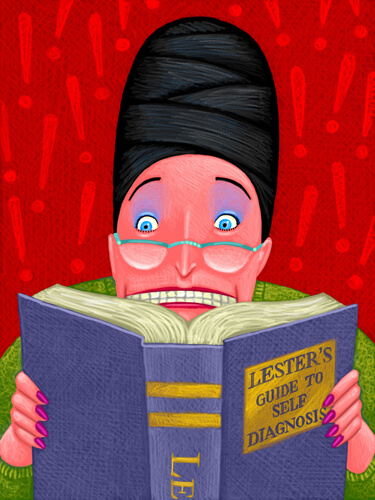Hypochondriac tendencies - are you reading too much on Google?

No doubt you’ve checked some health symptoms on the internet at some point in your life. Or maybe you do it quite often. Or has it perhaps become an obsession that has turned you into a hypochondriac?.
The fear of falling ill is a universal fear. This fear can come in many shapes and sizes. There can also be many different stimuli that make it come to the forefront of our thoughts, and even to completely invade them. Hypochondriacs feel this fear constantly and in many cases they really suffer from it.
They say that 70% of medical students at some point in their studies come to the conclusion that they are suffering from every disease that they’ve ever studied. They believe that they’ve got the very same symptoms of the illnesses they are studying. This stage they go through goes by the name of “transient hypochondria“.
We’ve all got friends who are constantly suffering from all the different diseases that Dr. Google in his kindness has diagnosed for them. And how many friends do we know who seem to have all the diseases and illnesses they see on television? They feel chest pain when they’re coughing and think that it must surely be something fatal. Our response is usually “don’t be a hypochondriac!”.
Doctors cut, burn, and torture. The good they do to the sick seems to be more bad than good, and they demand a reward that they almost do not deserve.
-Heraclito of Ephesus-
Experts in interpreting the signals
Many people have a tendency to interpret everything that happens to them. They amplify any signal that they perceive, especially if these signals come from their bodies. Many of these have to do with our personality, parenting styles, experiences while growing up, and the beliefs and ideas we all have. Examples of situations we may over-analyze could be the following:
- My colleague Peter didn’t greet me when he passed me by. Maybe he’s angry with me?
- The neighbors are banging again, just to annoy us.
- He hasn’t invited me to the party, he probably doesn’t like me.

We become expert interpreters because it’s difficult for us to tolerate uncertainty. Giving a meaning to everything relieves brain stress, and yet all the situations above have alternative scenarios. For example:
- Peter was worried as he had been called to the boss’s office.
- The neighbour’s grandchildren are there, and they’re running and playing, just like kids do.
- He sent the invitations by email and he’s got my email address wrong.
When these interpretations revolve around the family, friends or colleagues, they can cause us great concern, but we can usually find out the truth by asking them or other people directly. On the other hand, when health issues appear, anxiety levels can go through the roof in the face of so much uncertainty.
“The true strength of an idea is not in what it’s worth, but in the attention you give it”
-Concepcion Arenal-
They call me a hypochondriac, are they exaggerating?
A pain, fever, a cough … all of us at some point have been concerned or scared by not knowing, by diagnosing ourselves, and by speculating about what may be wrong with us. Waiting for tests, being referred to other specialists, people’s opinions… They all make us doubt and worry.
Does that make you a hypochondriac though? Probably not. As long as you keep going to work, keep going to family get-togethers, trips and fulfill all the other plans in the diary. And as long as the worry doesn’t stop you leading a normal life…
What was previously called hypochondria is currently known as “disease anxiety disorder”. With this change of name, we avoid the offensive aspect of the previous name, but the problem remains.
Here are the main characteristics of this disorder:
- The fear, concern or conviction that one is suffering from a serious illness, simply due to a personal interpretation of the symptoms.
- The worry persists despite medical examinations and explanations.
- The worry causes discomfort and deterioration socially, at work and in other areas.
- This state of worry is at for least 6 months.
- Not being able to explain all the above due to another nervous disorder, depression, or delirious state.

No reason or logic…
If we try to have a reasoned dialogue with a hypochondriac then it be an exasperating experience, because they tend not to attend to reason. They ignore the evidence that contradicts the diagnosis they have made about themselves.
They tend to visit different doctors seeking a diagnosis, attending appointments selectively according to what they want to hear. When changes happen in their bodies they interpret them in a very negative way and distrust experts. The worry makes them look for information and constantly check how their symptoms are evolving.
Mona Lisa looks as if she’s just been ill or is about to be
-Noel Coward-

Regardless of the severity of the symptoms that people develop with this problem, there are some ways we can control our “hypochondria”. Permanently observing ourselves, interpreting what is happening to us, or searching for information on Google before asking our doctor only increases our anxiety.
This will make us believe the worst, without any real proof. Only by respecting the process of time and not getting ahead of ourselves will we be able to achieve a balance and emotional calm concerning our health.
This text is provided for informational purposes only and does not replace consultation with a professional. If in doubt, consult your specialist.








